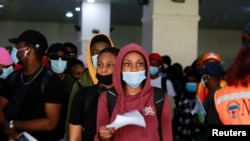Ukrainian education authorities reported that their nation housed approximately 76,000 foreign students prior to Russia’s February 24 “special military operation.”
Experts echoed the statistics released President Volodymyr Zelenskiyy’s administration and added that Nigeria accounted for 4,000 of those students, the largest number from sub-Saharan Africa, followed by Egyptians and Moroccans.
Abigail Theophilus, a Nigerian medical student who was based at Ukraine’s Sumy State University said she vividly remembers the day the war started.
“That morning I went to get an x-ray done and I went into town and everywhere was empty, people were lining up to get food. And at first the threat of war was, it was a regular thing in Eastern Europe to hear about war, but this was serious, people had left, everywhere was scanty,” said Theophilus.
The medical student further said she realized she had to flee the conflict after she witnessed a missile strike.
“In Sumy state it was difficult for anybody to leave, so the day I realized I needed to leave was when, during the evening time, there was a missile that was sent to one for their powerhouse, and I saw it pass,” she said.
“I’ve never seen a missile before. The explosion happened and it was night but everywhere looked as bright as day and it dawned on me that this was actually war,” she added.
Kofowuraola Adewole, another student from the West African nation who fled the war said he is grateful that he can continue his studies online from Nigeria.
“I wouldn’t say it’s been a great experience to have this big change in my life but I’m just grateful that I did start university despite the fact that Nigerian university system itself took me like two years back,” said Adewole.
“I’m supposed to graduate like next year but unfortunately, I’m supposed to graduate in like three and a half years’ time, which is a big change for me,” he added.
Elijah Kamani, a West African medical student based in Vinnytsia, a town in west-central Ukraine said she stayed in the East European nation despite the ongoing war.
“As the summer arrived, a lot of tourists and other people began to come back and the city was vibrant, it had life in it. I didn’t see the need to leave at that point, so I stayed during the summer,” said Kamani.
“I enjoyed it as normal people would even though there were threats. We had air alarms, we had to go to bunkers,” she added.






